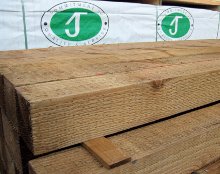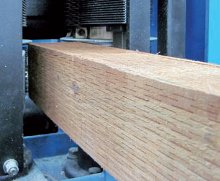Making a stand
13 October 2012Grange Fencing and James Jones & Sons are teaming up to supply incised spruce or kiln-dried redwood fence posts. Beverley Main reports
Much has been said and written recently on the subject of premature fence post failure. Several sawmills, merchants and fencing companies are now adding incised spruce fence posts or kiln-dried redwood posts treated to Use Class 4 (UC4) to their offerings.
Grange Fencing is going one step further. From the beginning of 2013, its entire sawn fence post range will be UC4 treated incised spruce and its entire production of machined or planed fence posts will be UC4 treated kiln-dried redwood. In making this stand, which it announced at Glee Grange has teamed up with James Jones & Sons to supply both the incised spruce and the kiln-dried redwood.
Grange has previously led the way amongst fencing manufacturers by using superior dark and golden brown fencing treatments, providing its panels with a colour that will resist fade for two seasons, twice the industry norm. The objective was to extend both shelf life for the merchant and service life for the consumer. In addition, pressure-treated panels are available as well as panels painted in a wide range of premium colours. Grange now plans to carry the superior treatment theme into the key area of fence posts.
James Jones & Sons installed incising technology earlier this year after its experiences with incised timber through Stella-Jones, its North American treated lumber specialist, led it to Roy Huttleburg of RJH Incisors and the proven technology and reliability of his designs. The high-speed machine has been commissioned as part of an integrated line at James Jones's Lockerbie sawmill. Lockerbie has the kilning capacity coupled with green and brown treatment to take full advantage of the benefits brought through incising.
All Grange and James Jones incised posts will carry a 15-year service life guarantee underwritten by chemical manufacturer Lonza Wood Protection. And Grange and James Jones will combine to offer all merchants and customers a 'keep-it-simple' guarantee backed by prominent, jointly branded point-of-sale signage. Grange will use its extensive display erection and merchandising teams in the spring to install informative signs wherever needed. In addition, the year of manufacture will be clearly identified by a bar code label.
Commenting on this milestone decision, Grange's managing director, Duncan Hill, said that, as the UK's largest manufacturer of domestic fencing, he believes the company should "take a professional approach and only sell fence posts that are demonstrably fit for purpose".
"We decided to team up with James Jones because its guarantee was simple to transfer up and down the supply chain; because it has an in-line incising machine with a suitable capacity; and because it can supply kiln-dried redwood and spruce."
Ian Pirie, James Jones's joint managing director, shares this sentiment. "We are delighted that Grange Fencing has made such a clear commitment to treatment quality as we feel that this really moves the fencing industry forwards," he said.
"Merchants can buy their larger volumes direct from us and their smaller volumes and split packs from Grange. Together we can both promote our new generation fence posts through our merchant networks. In turn, merchants can have a common marketing message and product guarantee regardless of whether they source posts through James Jones or through Grange.
"With so much spruce grown in the UK, any breakthrough in making effective fence post treatment more available had to include a solution to the age-old problem of how to effectively penetrate spruce," continued Mr Pirie. "In reaching a decision to go down the incising route, we have worked closely with Lonza who is now underwriting the 15-year guarantee and providing a third-party quality assurance."
"We decided to use incised spruce for our sawn posts as the incisions themselves will help differentiate the new posts," added Mr Hill. "We want the consumer and the contractor to recognise incising as a mark of quality and to question the treatment of any post that hasn't been incised."
"It is high time the timber supply industry took responsibility for its products and stopped hiding behind people's ignorance in specification," said Mr Pirie. "We know what a post is being used for and it is our duty of care to our customers to ensure that this is supplied fit for purpose - ie treated to Use Class 4."

